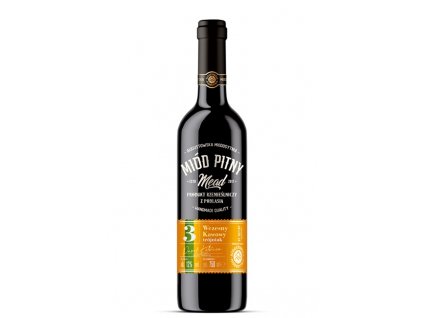In this sweet Polish mead you will feel the distinctive aroma of a ripe apple orchard during the late summer. Sweet, slightly peppery taste of juicy ripe apples.
Light fresh apple mead. Wine-honey taste, sweet with mild acidity of apples. Mead made in the style formerly known as cider, in which half of the water in the honey base was replaced with freshly squeezed apple juice from a local cider house.
For a classic trójniak, Apple on honey is significantly sweeter. Compared to conventional cysers, it does not have as strong acids, because of must from very ripe sweet apples.
Extremely good drink in its category, which I can only recommend.
mead
Mead is an alcoholic beverage fermented from honey and water, with possibility of addition of other ingredients such as spices or herbs or in combination with fruit juices.
Melomel - cyser
Cyser is a type of melomel which is fermented with apple juice.
Production process
This mead was made cold. This means that during its production, the honey was not heated above 40-45 °C, which is the normal temperature in nature to which honey is resistant. At higher temperatures, some precious components of honey can be damaged and degraded. Cold-made mead is the best choice.
Producer Augustowska Miodosytnia
Founders Piotr Piłasiewicz and Paweł Kotwica decided to reborn mead production in north-eastern Poland based on the traditions of the Polish-Lithuanian region. They come with interesting types of mead
Founders Piotr Piłasiewicz and Paweł Kotwica decided to restore the production of mead in north-eastern Poland, based on the traditions of this Polish-Lithuanian region. They come with interesting types of meads.
The idea of creating Augustowska Miodosytnia was born from our involvement in the revival of beekeeping and the willingness to share experiences with home mead production. As with beekeeping, honey production is a beautiful old Polish tradition, pushed out of the market and public awareness by the popularization of more economical forms of production. We opened Augustowska Miodosytnia to produce the highest quality mead in the traditional way, using only natural ingredients obtained from the Augustów forest and neighboring areas. We allocate part of the profits to the development of beekeeping by supporting the activities of the Bartne Brotherhood, from which we originate. Our mead recipes are derived from the rich tradition of mead production in the Polish-Lithuanian Commonwealth. We want to recreate the tastes that pleased our ancestors. According to this principle, we were the first in Poland to start the production of the forgotten Zbiceń.
The proper production of mead begins with dissolving the honey in the appropriate amount of water for the given recipe. It is then heated and cooked with spices and seasonings. This is how honey wort is produced, which is then pumped into a stainless steel fermentation tank, stirred intensively and, after cooling, yeast is added. After the first phase of fermentation, i.e. after approximately 3-12 weeks, depending on the type of honey (after the so-called turbulent fermentation), the honey goes into the next phase of production, during which it matures calmly, clears and acquires "character" over time. It takes 3 to 12 months. The honey is bottled when both laboratory tests and organoleptic tests confirm its correct "strength", as well as taste, color and aroma. Approximately 1,300 bottles of alcohol are produced in one production process. For example - we need a whole year to produce Trójniak. We don't want to speed up the natural processes because we know that good drinks are worth waiting for.











